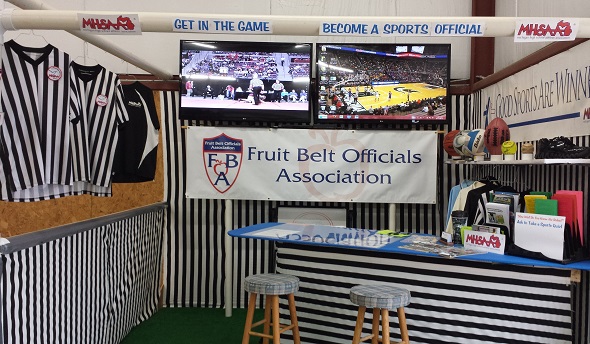
Fruit Belt 'Interacts' to Recruit Officials
August 27, 2014
By Rob Kaminski
MHSAA benchmarks editor
The MHSAA always is seeking creative ideas for recruiting some of the most important people in high school athletics – officials to preside over the games.
The Fruit Belt Officials Association once again hosted an interactive recruitment booth at the Berrien County Youth Fair, staffed by volunteers from the membership.
Freddy Krieger, who coordinated the project for the FBOA, says the outreach effort enabled the group to connect with people outside the athletic community who otherwise likely wouldn’t have known the organization existed.
“There are a lot of people in our area who said, ‘I always wanted to (officiate), but I didn’t know how to start,’” he said. “I heard it from people when I manned the booth myself.”
A longtime basketball official, Krieger, who has also worked soccer and baseball, believes it’s vital that officials associations actively search for new members, rather than waiting for prospects to come to them.
“The average age of officials in the state of Michigan is 48,” he says. “There are a number of us in the association who say, ‘We’ve got to replace ourselves.’”
The display includes flat screen TV monitors with video loop of games in a variety of sports, “Ask the Official” opportunities for the public to find answers to their rules questions, FBOA and MHSAA logos, and an “interest box” where prospective officials can leave contact information.
The booth attracted 43 individuals who totaled 71 officiating preferences in six sports. Krieger reported that a year ago the booth cultivated 108 prospective officials – 23 interested for basketball, 22 baseball, 17 softball, 16 football, 13 volleyball, seven wrestling and 10 soccer prospects.
All prospects are invited to the FBOA general meeting in September, and contact information is forwarded to sport-specific trainers and contact people who diligently follow up to involve them in orientation, training, and integration as officials in various sports.
Individuals from previous years also are re-invited.
“Sometimes it takes a year or two – or even three – to get someone to make the kind of commitment it takes to become integrated into our avocation and submit to the required training,” Krieger said.

Why They Don’t Officiate Anymore
December 16, 2016
Several years ago, the Michigan High School Athletic Association produced a series of radio and television spots in which MHSAA registered officials explain why they officiate. For the third time in the past 12 years (2004, 2012, 2016), the MHSAA conducted an extensive survey of former MHSAA officials to identify the reasons individuals have left the avocation of high school officiating.
From the 1,065 responses to the 2016 survey, it is demonstrated that career and job changes continue to be the top reason why individuals leave officiating. This has been the No. 1 reason in all three surveys.
Local association politics was again the No. 2 reason, which was the same second place reason in 2012. However, in the 2004 survey results, local association politics was sixth. This illuminates the reality that over the past 12 years there has been a significant shift from local schools hiring officials to using assigners in many, if not all, sports. The concerns are not so much with the association itself (training, recruiting, retaining) but with the assigning dynamic within the association or local area. Many recent MHSAA policy changes and most MHSAA in-service training have focused directly on assigners, and this survey confirms that this must continue and expand.
The next three most common reasons for leaving MHSAA officiating continue to be lack of sportsmanship by coaches, lack of sportsmanship by spectators, and low game compensation. The sportsmanship concerns from these adults must be continually addressed by all MHSAA constituent groups to improve the working conditions for officials.
The MHSAA increased tournament officiating fees at the start of the 2016-17 school year, and many local leagues and conferences have done the same. The reality is that many leagues and conferences are still playing “catch up” from the long fee freezes in the late 2000s and early 2010s when Michigan schools were in historically bad financial shape.
A significant reason to leave officiating seen in all three surveys is the official’s family situation. Many have indicated they left officiating due to time away from their spouse or children, or because of travel time or a family move. These reasons have been in the top 10 in all three surveys, and could have ranked higher had these individual questions been combined into one single category.
One troubling trend from the 2016 survey is that lack of sportsmanship by players was inside the top 10 (No. 7) for the first time since 2004. In 2012, this issue with students was No. 11. This may show that players are much more apt to argue, criticize or demonstratively disagree with calls than years ago.
(This posting was prepared with the assistance of MHSAA Assistant Director Mark Uyl.)

